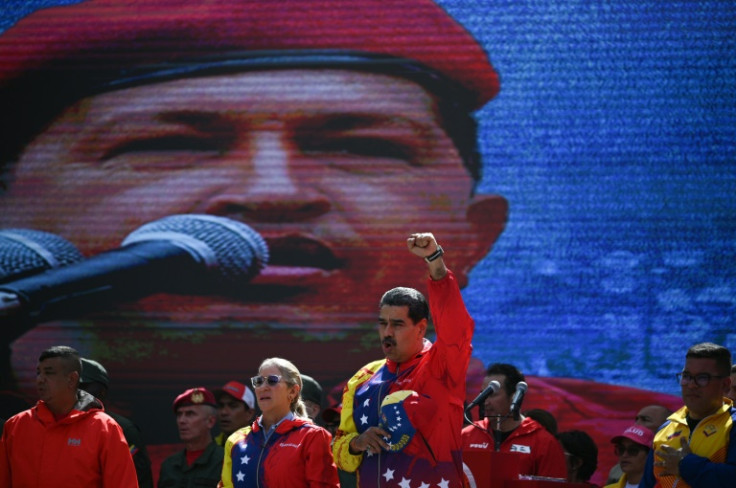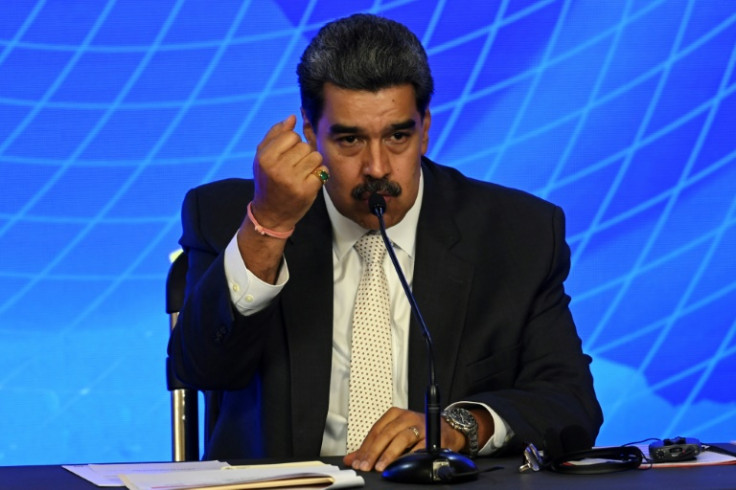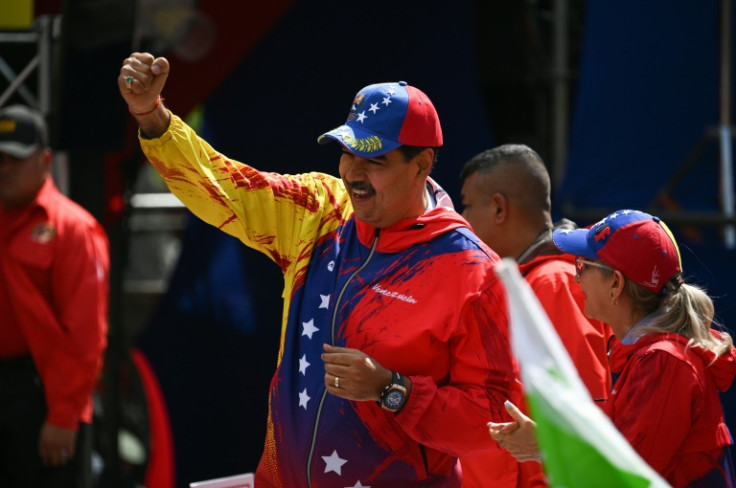Venezuela's Maduro: Marxist, Christian, Iron-fisted 'Superhero'

Venezuela's President Nicolas Maduro has been written off many times during a turbulent decade in power. But the former bus driver and anointed heir of Hugo Chavez has stubbornly clung to the wheel.
With neither the charisma nor the flush oil revenues of his late revolutionary mentor, Maduro is accused by rights groups of embracing full-blown authoritarianism to hold on to power.
Hugely unpopular after years of economic crisis, the 61-year-old will still seek a third consecutive six-year term in July 28 elections -- against a severely weakened political opposition in what critics call a campaign of relentless persecution.
Tall, and sporting a full mustache and slicked-back graying hair, Maduro was thrust into power as the handpicked successor of Chavez, who died of cancer in 2013 but is still hailed by many as a revolutionary hero.
Struggling to gain respect as the legitimate successor to Chavez, Maduro won his first election with a razor-thin margin.
Since then, he has fended off crisis after crisis, ruling with an increasingly iron fist and consolidating power even as life for the average Venezuelan grew ever more miserable.
Millions of Venezuelans have fled a dire economic crisis marked by runaway inflation and critical shortages as an oil boom went bust partly due to a plunge in global crude prices.
Born in Caracas and a professed Marxist as well as a Christian who has "found God on my journey," Maduro as a teenager played guitar in a rock band called Enigma.
He is a baseball fan and dances salsa.
Maduro became a union leader for workers on the Caracas metro and went to communist Cuba in the 1980s for a political education.
Elected to the National Assembly when Chavez swept to power, he rose to become speaker of the legislature before taking over as foreign minister in 2006 and then vice president in October 2012.
In December of that year, Chavez officially declared Maduro his successor before travelling to Cuba for cancer treatment.
He died three months later and Maduro took over, much to the surprise of even some in the ruling United Socialist Party of Venezuela (PSUV).
It was not the first nor last time Maduro was underestimated. In fact, he has embraced criticism that he is boorish and provincial, trying to cast himself as a "worker president."
It has even been claimed that he deliberately misspeaks in English so as not to be mistaken as high-brow.
As president, Maduro has weathered many threats imagined and real -- including a failed explosive-laden drone attack in 2018 that injured several soldiers.
Activists say his government has clamped down ruthlessly on protests against his harsh rule and economic misery, which worsened as his nominally socialist government was forced to slash social spending.
Maduro successfully faced down sanctions that followed the non-recognition of his reelection in 2018, and focused on tightening control over the judiciary, legislature, military and state institutions.
The president has also benefited from close political and economic ties with China, Russia and other autocratic international actors that have helped the country stay barely afloat.
To deflect blame for Venezuela's woes, Maduro has sustained Chavez's anti-American conspiracy theories, accusing the United States of plotting to kill him and Western nations of ruining the once-thriving economy.
Maduro is accused of closing off virtually any channels for political dissent, locking up dissidents and challengers with little regard for due process.
His main rival, Maria Corina Machado, overwhelmingly won an opposition primary vote but has been disqualified from holding public office on the back of charges she and others claim are spurious.
Venezuela is under investigation for rights violations by the International Criminal Court.
Even as the country continued spiraling, Maduro showed himself to be adept at realpolitik.
Last year, he won an easing of US sanctions and other concessions by agreeing with the opposition to hold elections this year.
But he reneged on the conditions, and sanctions were snapped back in April, though Washington is allowing companies such as Chevron and Repsol to apply for individual licenses to keep operating in Venezuela.
Maduro is adept at using state media to spread his message and has sought to endear himself to a long-suffering population though a popular TV and internet cartoon character in his image.
Super-Bigote (Super Moustache) is a caped superhero "at war with imperialism."
He has recently also adopted the emblem of a fighting cock, "Gallo Pinto," to highlight his sprightliness relative to 74-year-old opposition challenger Edmundo Gonzalez Urrutia -- who is far ahead in polls.
In real life, Maduro often appears in public with his wife Cilia Flores, a former prosecutor he refers to as "First Combatant."


© Copyright AFP 2024. All rights reserved.






